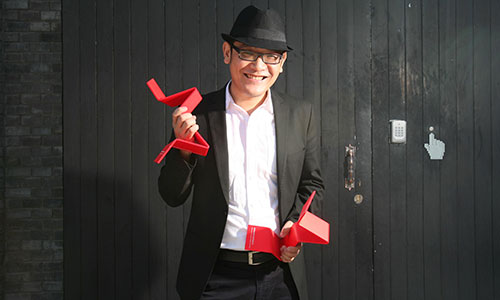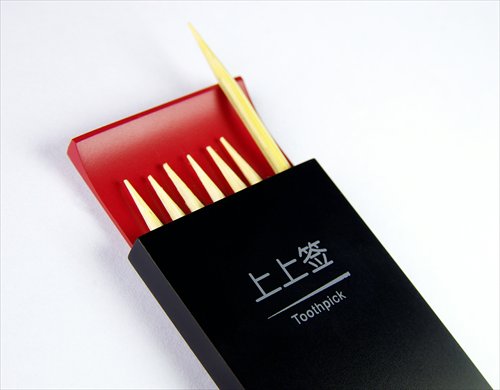HOME >> LIFE
'Jia Wei style' wins acclaim
By Liao Danlin Source:Global Times Published: 2013-12-10 18:13:01

Jia Wei draws creative inspiration from traditional Chinese culture. Photo: IC
Living up to the hype of being dubbed "China's Steve Jobs" hasn't been easy for Jia Wei, an industrial designer and the founder of LKK Design. The moniker was given to him at this year's Red Dot Design Awards, an international product design competition, held in Shanghai on December 4. Jia spoke there about his decision nearly a decade ago to quit his job at tech giant Lenovo after five years of service.After leaving the company in 2004, Jia thought about how he could use his rich knowledge in industrial design and design management in his own startup.
With a big dream and modest resources, he rented an office for 500 yuan ($82.30) per month with a desk as his only asset.
But it wasn't all smooth sailing at first, Jia recalled.
"I just needed a place to work, but in the beginning nobody would rent office space to me. A company later agreed under the condition it received a 20 percent stake in our startup," Jia told the Global Times.
Today, LKK Design is regarded as one of the top firms in its field in China, with seven Red Dot Design Awards to its credit.
The company employs more than 300 people at its five offices, one in London and four in China, and has a blue-chip list of clients that includes BMW, Dell, Air China and the National Basketball Association.
Eyes on the prize
Jia admits to being gripped by "prize fever," saying he values industry accolades for three distinctive reasons. First, Jia claims prizes symbolize professional acceptance from the industry on an international level.
"It's like athletes striving to win gold at the Olympic Games," he explained.
Second, prizes increase the value and prestige of his company in clients' eyes. Finally, Jia said there is "social value" attached to his success as one of the few Chinese entrepreneurs making waves in the industrial design world.
"The general impression of Chinese industrial designers is that they mostly copy or borrow ideas from others, but Chinese can be creative and present original ideas. Our generation must invest time in developing our creative confidence," said Jia.
His drive to enhance Chinese designers' global reputation has led Jia to draw inspiration from traditional Chinese culture.
Jia's first Red Dot Design Award was earned by "Shangshangqian Toothpick," a reference to a term for the best fortune one can draw at a temple.
"Judges at the Red Dot Awards are all Europeans. I didn't expect them to understand the Chinese cultural meaning behind the product, nor expect it to win. I just wanted to spread Chinese culture," said Jia.

Shangshangqian Toothpick Photo: Courtesy of LKK Design
Fusing tradition and modernityJia has also tapped foreign influences in his career, which during its early days involved Japanese, American and Scandinavian styles.
Learning the basics of different styles allowed him to satisfy clients with ease, even if it left him feeling a bit creatively lost in the process.
Jia was still searching for a unique style rooted in Chinese culture with Western traits of modern industrial design when he decided to leave Lenovo and establish LKK Design.
Jia noted that the "design language" of all countries takes time to evolve, with China no exception. However, he insists that the country's contemporary weaknesses shouldn't tarnish outsiders' perception of design innovation.
"Some say Chinese culture in the 21st century is blundering, which might describe modern China but can never be accurate for a country with a 5,000-year history," he said.
Jia noted differing concepts of power in Chinese and American culture as being divided by natural and sci-fi forces, nominating the examples of earthquakes and superheroes.
"If you see Chinese paintings, people are depicted as being small compared to the background landscape. But Western paintings focus on the human element. These are some differences in regards to culture, aesthetics and philosophy," Jia said. In recent years, he has also created a unit brand under LKK Design and been more discerning in his choice of projects that personally involve him.
Strength in numbers
Jia said that one of China's biggest advantages is its growing workforce of talented designers. At the core of the industrial design sector is its people. Whether a firm can foster talent at the grass-roots level is critical, said Jia.
"Finding 300 designers in a European country is no easy feat, but in China it's no big problem to mobilize 30,000 designers. We have a treasure chest of talent," he said.
Looking to the future, Jia said he has high hopes for LKK Design to continue on its quest to turn heads in the industry by winning more prizes.
"Chinese designers still need time to explore their 'language' and style. For me, Chinese culture is like water: gentle, yet also capable of being powerful," Jia said.
Posted in: Diversions